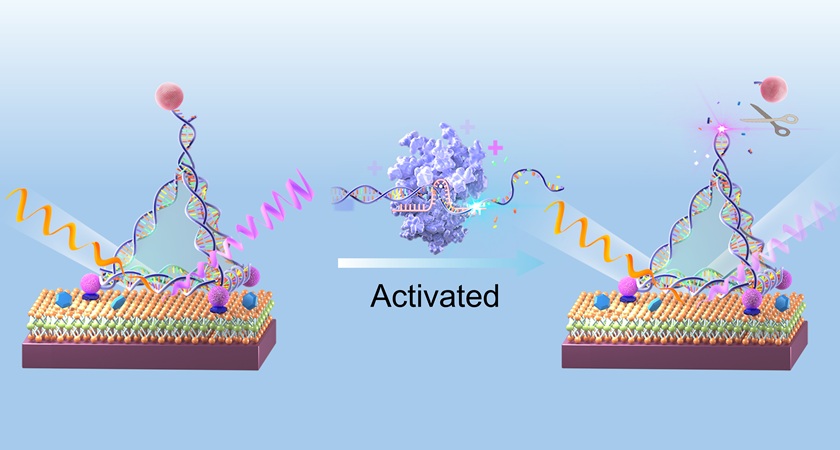Nanoparticle Packaging Dramatically Increases Potency of Anti-Cardiovascular Disease Drug
|
By LabMedica International staff writers Posted on 06 Jul 2015 |
![Image: The buildup of fatty substances in blood vessels caused by atherosclerosis stiffens and narrows the blood vessels resulting in the death of heart muscle (Photo courtesy of [US] National Heart, Lung, and Blood Institute). Image: The buildup of fatty substances in blood vessels caused by atherosclerosis stiffens and narrows the blood vessels resulting in the death of heart muscle (Photo courtesy of [US] National Heart, Lung, and Blood Institute).](https://globetechcdn.com/mobile_labmedica/images/stories/articles/article_images/2015-07-06/GMS-208.jpg)
Image: The buildup of fatty substances in blood vessels caused by atherosclerosis stiffens and narrows the blood vessels resulting in the death of heart muscle (Photo courtesy of [US] National Heart, Lung, and Blood Institute).
The use of biodegradable polymer nanoparticles to encapsulate a promising drug for treating atherosclerosis increased its residence time in the body of a treated mouse from less than one hour to at least four hours (and up to 48 hours or longer).
The drug, D-PDMP (D-Threo-1-phenyl-2-decanoylamino-3-morpholino-1-propanol), is a glycosphingolipid synthesis inhibitor. Previous studies had shown that it held considerable promise for the treatment of atherosclerosis and cardiac hypertrophy, but rapid in vivo clearance severely hindered its use in the clinical setting.
To overcome this impediment, investigators at Johns Hopkins University (Baltiomore, MD, USA) sequestered D-PDMP inside a biodegradable polymer composed of polyethylene glycol (PEG) and sebacic acid (SA).
Some PEG-SA nanoparticles were labeled with PEG that contained a radioactive iodine tracer to allow in vivo bio-distribution and release kinetics of D-PDMP to be determined by using gamma-scintigraphy and subsequently, by mass spectrometry. Results published in the June 3, 2015, online edition of the journal Biomaterials revealed that polymer encapsulation increased the residence time of D-PDMP in the body of a treated mouse from less than one hour to at least four hours (and up to 48 hours or longer).
The substantially increased in vivo longevity provided by polymer encapsulation resulted in a 10-fold gain in the drug's efficacy for interfering with atherosclerosis and cardiac hypertrophy in a model based on mice genetically engineered to lack the gene for the apolipoprotein E receptor that were fed a high fat and high cholesterol diet.
"Our experiments illustrate clearly that while content is important, packaging can make or break a drug," said senior author Dr. Subroto Chatterjee, professor of medicine and pediatrics at Johns Hopkins University. "In our study, the right packaging vastly improved the drug's performance and its ability not merely to prevent disease but to mitigate some of its worst manifestations."
Related Links:
Johns Hopkins University
The drug, D-PDMP (D-Threo-1-phenyl-2-decanoylamino-3-morpholino-1-propanol), is a glycosphingolipid synthesis inhibitor. Previous studies had shown that it held considerable promise for the treatment of atherosclerosis and cardiac hypertrophy, but rapid in vivo clearance severely hindered its use in the clinical setting.
To overcome this impediment, investigators at Johns Hopkins University (Baltiomore, MD, USA) sequestered D-PDMP inside a biodegradable polymer composed of polyethylene glycol (PEG) and sebacic acid (SA).
Some PEG-SA nanoparticles were labeled with PEG that contained a radioactive iodine tracer to allow in vivo bio-distribution and release kinetics of D-PDMP to be determined by using gamma-scintigraphy and subsequently, by mass spectrometry. Results published in the June 3, 2015, online edition of the journal Biomaterials revealed that polymer encapsulation increased the residence time of D-PDMP in the body of a treated mouse from less than one hour to at least four hours (and up to 48 hours or longer).
The substantially increased in vivo longevity provided by polymer encapsulation resulted in a 10-fold gain in the drug's efficacy for interfering with atherosclerosis and cardiac hypertrophy in a model based on mice genetically engineered to lack the gene for the apolipoprotein E receptor that were fed a high fat and high cholesterol diet.
"Our experiments illustrate clearly that while content is important, packaging can make or break a drug," said senior author Dr. Subroto Chatterjee, professor of medicine and pediatrics at Johns Hopkins University. "In our study, the right packaging vastly improved the drug's performance and its ability not merely to prevent disease but to mitigate some of its worst manifestations."
Related Links:
Johns Hopkins University
Latest BioResearch News
- Genome Analysis Predicts Likelihood of Neurodisability in Oxygen-Deprived Newborns
- Gene Panel Predicts Disease Progession for Patients with B-cell Lymphoma
- New Method Simplifies Preparation of Tumor Genomic DNA Libraries
- New Tool Developed for Diagnosis of Chronic HBV Infection
- Panel of Genetic Loci Accurately Predicts Risk of Developing Gout
- Disrupted TGFB Signaling Linked to Increased Cancer-Related Bacteria
- Gene Fusion Protein Proposed as Prostate Cancer Biomarker
- NIV Test to Diagnose and Monitor Vascular Complications in Diabetes
- Semen Exosome MicroRNA Proves Biomarker for Prostate Cancer
- Genetic Loci Link Plasma Lipid Levels to CVD Risk
- Newly Identified Gene Network Aids in Early Diagnosis of Autism Spectrum Disorder
- Link Confirmed between Living in Poverty and Developing Diseases
- Genomic Study Identifies Kidney Disease Loci in Type I Diabetes Patients
- Liquid Biopsy More Effective for Analyzing Tumor Drug Resistance Mutations
- New Liquid Biopsy Assay Reveals Host-Pathogen Interactions
- Method Developed for Enriching Trophoblast Population in Samples
Channels
Clinical Chemistry
view channel
Rapid Blood Testing Method Aids Safer Decision-Making in Drug-Related Emergencies
Acute recreational drug toxicity is a frequent reason for emergency department visits, yet clinicians rarely have access to confirmatory toxicology results in real time. Instead, treatment decisions are... Read more
New PSA-Based Prognostic Model Improves Prostate Cancer Risk Assessment
Prostate cancer is the second-leading cause of cancer death among American men, and about one in eight will be diagnosed in their lifetime. Screening relies on blood levels of prostate-specific antigen... Read moreMolecular Diagnostics
view channel
Light-Based Sensor Detects Early Molecular Signs of Cancer in Blood
Early cancer diagnosis is often hindered by the extremely low concentration of biomarkers present at the onset of disease. Proteins, DNA fragments, and other molecular markers can reveal cancer risk or... Read more
New Testing Method Predicts Trauma Patient Recovery Days in Advance
Trauma patients with nearly identical injuries often experience very different recoveries, even when treated similarly. Traditional assessments based on injury severity do not always explain why some patients... Read moreHematology
view channel
New Guidelines Aim to Improve AL Amyloidosis Diagnosis
Light chain (AL) amyloidosis is a rare, life-threatening bone marrow disorder in which abnormal amyloid proteins accumulate in organs. Approximately 3,260 people in the United States are diagnosed... Read more
Fast and Easy Test Could Revolutionize Blood Transfusions
Blood transfusions are a cornerstone of modern medicine, yet red blood cells can deteriorate quietly while sitting in cold storage for weeks. Although blood units have a fixed expiration date, cells from... Read more
Automated Hemostasis System Helps Labs of All Sizes Optimize Workflow
High-volume hemostasis sections must sustain rapid turnaround while managing reruns and reflex testing. Manual tube handling and preanalytical checks can strain staff time and increase opportunities for error.... Read more
High-Sensitivity Blood Test Improves Assessment of Clotting Risk in Heart Disease Patients
Blood clotting is essential for preventing bleeding, but even small imbalances can lead to serious conditions such as thrombosis or dangerous hemorrhage. In cardiovascular disease, clinicians often struggle... Read moreImmunology
view channelBlood Test Identifies Lung Cancer Patients Who Can Benefit from Immunotherapy Drug
Small cell lung cancer (SCLC) is an aggressive disease with limited treatment options, and even newly approved immunotherapies do not benefit all patients. While immunotherapy can extend survival for some,... Read more
Whole-Genome Sequencing Approach Identifies Cancer Patients Benefitting From PARP-Inhibitor Treatment
Targeted cancer therapies such as PARP inhibitors can be highly effective, but only for patients whose tumors carry specific DNA repair defects. Identifying these patients accurately remains challenging,... Read more
Ultrasensitive Liquid Biopsy Demonstrates Efficacy in Predicting Immunotherapy Response
Immunotherapy has transformed cancer treatment, but only a small proportion of patients experience lasting benefit, with response rates often remaining between 10% and 20%. Clinicians currently lack reliable... Read moreMicrobiology
view channel
CRISPR-Based Technology Neutralizes Antibiotic-Resistant Bacteria
Antibiotic resistance has accelerated into a global health crisis, with projections estimating more than 10 million deaths per year by 2050 as drug-resistant “superbugs” continue to spread.... Read more
Comprehensive Review Identifies Gut Microbiome Signatures Associated With Alzheimer’s Disease
Alzheimer’s disease affects approximately 6.7 million people in the United States and nearly 50 million worldwide, yet early cognitive decline remains difficult to characterize. Increasing evidence suggests... Read morePathology
view channel
AI Tool Helps See How Cells Work Together Inside Diseased Tissue
Microscopes have long been central to diagnosing disease by allowing doctors to examine stained tissue samples. However, modern medical research now generates vast amounts of additional data, including... Read more
AI-Powered Microscope Diagnoses Malaria in Blood Smears Within Minutes
Malaria remains one of the world’s deadliest infectious diseases, killing hundreds of thousands each year, mostly in under-resourced regions where laboratory infrastructure is limited. Diagnosis still... Read moreTechnology
view channel
Robotic Technology Unveiled for Automated Diagnostic Blood Draws
Routine diagnostic blood collection is a high‑volume task that can strain staffing and introduce human‑dependent variability, with downstream implications for sample quality and patient experience.... Read more
ADLM Launches First-of-Its-Kind Data Science Program for Laboratory Medicine Professionals
Clinical laboratories generate billions of test results each year, creating a treasure trove of data with the potential to support more personalized testing, improve operational efficiency, and enhance patient care.... Read moreAptamer Biosensor Technology to Transform Virus Detection
Rapid and reliable virus detection is essential for controlling outbreaks, from seasonal influenza to global pandemics such as COVID-19. Conventional diagnostic methods, including cell culture, antigen... Read more
AI Models Could Predict Pre-Eclampsia and Anemia Earlier Using Routine Blood Tests
Pre-eclampsia and anemia are major contributors to maternal and child mortality worldwide, together accounting for more than half a million deaths each year and leaving millions with long-term health complications.... Read moreIndustry
view channel
WHX Labs in Dubai spotlights leadership skills shaping next-generation laboratories
WHX Labs in Dubai (formerly Medlab Middle East), held at Dubai World Trade Centre (DWTC) from 10–13 February, brings together international experts to discuss the factors redefining laboratory leadership,... Read moreNew Collaboration Brings Automated Mass Spectrometry to Routine Laboratory Testing
Mass spectrometry is a powerful analytical technique that identifies and quantifies molecules based on their mass and electrical charge. Its high selectivity, sensitivity, and accuracy make it indispensable... Read more
AI-Powered Cervical Cancer Test Set for Major Rollout in Latin America
Noul Co., a Korean company specializing in AI-based blood and cancer diagnostics, announced it will supply its intelligence (AI)-based miLab CER cervical cancer diagnostic solution to Mexico under a multi‑year... Read more


















